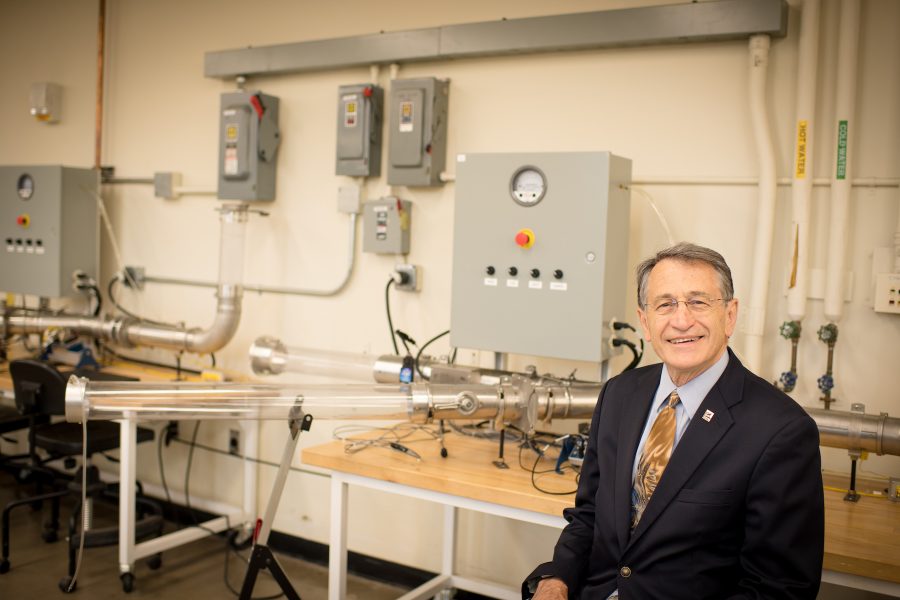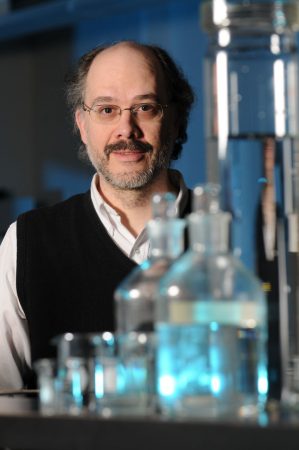
Bill Predebon, longtime chair of Mechanical Engineering-Engineering Mechanics at Michigan Tech, recently sent an email to all the students in his department. He asked three questions: “What went right? What went wrong?” And then, “Are you having any issues with tools?”
“Almost immediately I received 80 responses from undergraduates,” he said. “It’s important to solicit feedback directly from students while they are still in the midst of it.”
As universities across the state of Michigan and across the nation moved their courses to remote instruction to help slow the spread of COVID-19, Predebon had to act fast. Getting 1,736 students, and 55 faculty members entirely online in just four days was no small task.
“We’re a large ME department, one of the largest in the nation, but because of our strong sense of community of Michigan Tech, our culture of kindness, there was an immediate sense of responsibility to respond in a coordinated way—the best possible way,” says Predebon.
Predebon turned to ME-EM Associate Chair Jeff Allen, who quickly became the department’s conduit for using online tools.
“Jeff investigated the technology, so our faculty wouldn’t have to do that,” Predebon explains. “The majority had never taught online before—only about a dozen of our faculty had taken Michigan Tech’s online learning certification course.”

“The first thing I did was to rephrase the information,” says Allen. “It had been presented by type of software, but not by function.” ME-EM faculty with online teaching experience also started helping, making phone calls and emailing back and forth with their colleagues.
“It’s really hard to give a lecture in an empty room. There’s zero feedback,” says Allen. “We were showing our faculty how to use the online lecture tools on campus. But then, within a day or two, as we realized what might be coming, I began urging faculty to gather all they’d need to teach their courses from home.”
Allen quickly bought webcams for faculty, along with headsets and microphones. “Everyone seemed to have a different kind of technology at home. Webcams sold out very fast online. All around the country, everyone was doing the same thing,” he said.
Four years ago, the Department eliminated traditional mechanical engineering labs and replaced them with hands-on Mechanical Engineering Practice (MEP) courses I, II, III and IV. The MEP courses are designed to be adaptable so that new subjects can be embedded as technologies advance. But how to virtualize these intensive hands-on courses?
“Our Graduate Teaching Assistants really went above and beyond. Udit Sharma and JJ Song recorded a half semester’s worth of video demonstrations in less than a week for the second MEP. There were similar efforts by faculty, staff and graduate students for the other three MEP courses,” said Allen. “They did an amazing job.”
Meanwhile, another group was busy virtualizing the ME-EM department’s Engineering Learning Center, an idea suggested by academic advisor Ryan Towles. Aneet Narendranath, a senior lecturer in mechanical engineering, spearheaded the effort.
“Our learning center supports our core courses—Thermodynamics, Statics, Dynamics, and Mechanics of Materials,” says Predebon. “Students taking these fundamental courses can now access peer tutoring online, from home.”
“Michigan Tech’s Center for Teaching and Learning (CTL) shipped out document cameras to all our peer tutors. Then Dr. Narendranath coordinated a trial run—trying out the system as we put it into place,” says Allen. “Several faculty volunteered as guinea pigs, to let student tutors practice the system. We found subtle, odd things we weren’t expecting. Aneet and Ryan practiced together quite a bit more before we sent a message about it to all our students.”
Allen’s emphasis now has switched almost entirely to students. “At home, just like our faculty, their technology and tools vary. Some things really surprised us. For instance, very few students actually have a printer.”

“One of our students had no computer at home,” adds Predebon.”When I found out, I was able to get a computer into her hands, but it took a few days. I thought it took a long time. She said she thought it was fast.”
“Most students are doing well now, especially those with a strong internet connection,” says Allen. “Other students relied much more on our university system. We’ve been going back and forth to iron out the bugs. Faculty are very flexible with student deadlines,” says Allen.
“The situation has shown the tenacity and caring of our faculty,” says Predebon. “One faculty member herself lives in an area with poor internet access. She tried many things to improve it, to no avail. To solve the problem she drives to a university building and parks in front to upload lessons for her students, and download their work. The building is closed, but she can still log in to the internet from her car. She can get back to her family faster that way, too. She has young children at home.”
“It has been a fantastic effort. Now we want to get through this semester. We’ll see what the summer holds, and this coming year,” adds Predebon. “We’ll take it as it comes.”